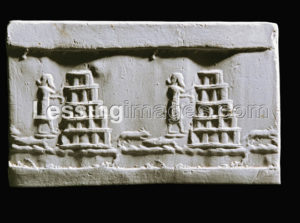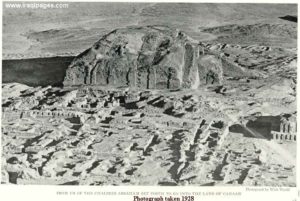Records of the Past, 2nd series, Vol. I, ed. by A. H. Sayce, [1888], at sacred-texts.com
(Texts: All Artifacts, Color Coding, & Writings in Bold Type With Italics Inside Parenthesis, are Added by Editor R. Brown, not the Authors, Translators, or Publishers!)
(gods in blue…mixed-breed demigods in teal…)
No. 1. COLUMN I
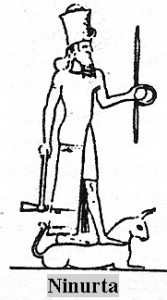
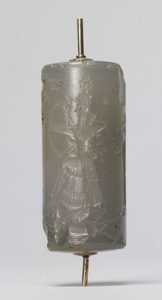 (Ninurta, KIng Anu‘s heir to the throne of planet Nibiru, after father Enlil)
(Ninurta, KIng Anu‘s heir to the throne of planet Nibiru, after father Enlil)
1. For the god Nin-girsu (Ninurta)
2. the warrior of the god Ellilla, (Enlil)
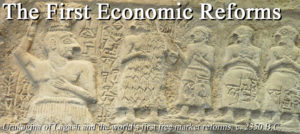 (giant semi-divine mixed-breed king Urukigina & his family)
(giant semi-divine mixed-breed king Urukigina & his family)
3. Uru-Kagina,
4. the king
5. of Shirpurla-ki (lagash),
6. his temple
7. has constructed.
8. His palace of Ti-ra-ash
9. he has constructed.
(1st gods, then kings built & repaired ziggurat temple residences of the gods in each city; ex: Ur above)
COLUMN II
1. The an-ta-shur-ra
2. he has constructed.
3. The E-gish-me-ra
4. in order to [be] the E-ne-bi of the countries
5. he has constructed.
6. The house of fruits which produces abundance (?) in the country
7. he has constructed.
8. For the god Dun-shagâna (unidentified?)
9. his habitation of Akkil
COLUMN III
1. he has constructed.
2. For the god Gal-alimma (Ig–alim, Ninurta‘s son)
3. the temple of E-me-gal-ghush-an-ki
4. he has constructed.
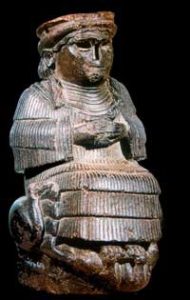
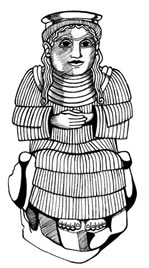 (Princess Bau, King Anu‘s daughter, spouse & aunt to Ninurta)
(Princess Bau, King Anu‘s daughter, spouse & aunt to Ninurta)
5. The temple of the goddess Bau (Ninurta‘s spouse)
6. he has constructed.
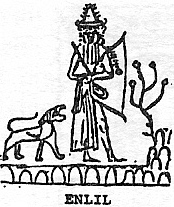
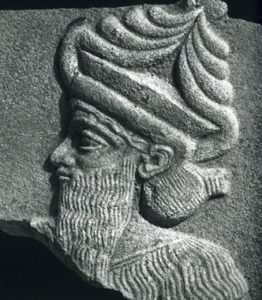 (Earth Colony Commander Enlil, King Anu‘s son & heir)
(Earth Colony Commander Enlil, King Anu‘s son & heir)
7. For the god Ellilla (Enlil)
8. the temple of E-adda,
9. his im-sag-ga,
COLUMN IV
1. he has constructed.
2. The Bur(?)-sag,
3. his temple which rises to the entrance of heaven (?),
4. he has constructed.
5. Of Uru-Kagina,
6. the king
7. of Shirpurla-ki,
8. who the temple of E-ninnû
9. has constructed,
10. his god
COLUMN V
1. is the god Nin-shagh (unidentified?).
2. For the life of the king
3. during the long days to come
4. before the god Nin-girsu (Ninurta)
5. may he (Nin-shagh) bow down his face!
No. 2 On a Buttress
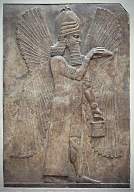 (Ninurta artifact, thousands of others & texts unearthed in Biblical Nineveh ruins)
(Ninurta artifact, thousands of others & texts unearthed in Biblical Nineveh ruins)
1. [For the god Nin-girsu],
2. [the] warrior
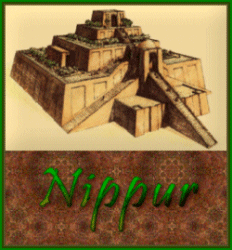
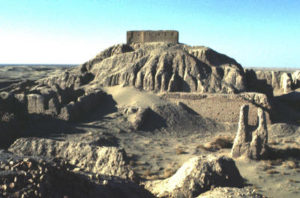 (Enlil‘s house in Nippur)
(Enlil‘s house in Nippur)
3. [of the god El]lilla (Enlil),
4. [Uru-]Ka[g]ina,
5. [the] king
6. [of Shirpur]la-ki,
7. [the Anta]-Shurra,
8. [the house] of abundance of his country,
9. [has] constructed.
10. His [palace] of Ti-[ra-ash]
11. [he] has constructed.
Lines 12 and 13 are destroyed.
14. [For the god] Gal-alimma (Ig-alim, Ninurta‘s son)
Lines 15–21 are destroyed.
22. [he has] constructed.
23. [For the god] Nin-sar (Enki & Ninhursag‘s daughter),
24. the bearer [of the sword?]
25. [of the god] Nin-girsu,
26. his temple
27. he has constructed.
28. [For the god …] gir (unidentified?)
29. the well-beloved
30. [of the god] Nin-girsu
31. his temple
32. he has constructed.
33. The Bur(?)-sag,
34. his temple which rises to the entrance of heaven (?),
35. he has constructed.
36. For the god Ellilla (Enlil)
37. the temple of E-adda?,
38. his im-sag-ga,
39. he has constructed.
40. For the god Nin-girsu
41. the sanctuary (?)
42. of E-melam-kurra
43. he has constructed.
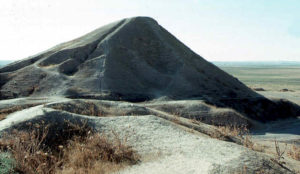 (Ninurta‘s temple residence of mud brick)
(Ninurta‘s temple residence of mud brick)
44. The temple wherein dwells (?) the god Nin-girsu
45. he has constructed.
46. Of Uru-Kagina,
47. who the temple
48. of the god Nin-girsu …
The inscription breaks of here, having never been finished.
_________
No. 3.—On a Cylinder
COLUMN I
The first lines are lost.
1. Uru-Kagina,
2. the king
3. Of Girsu-ki,
4. the Anta-shurra,
5. the house of abundance of his country,
6. his palace of Ti-ra-ash,
7. has constructed.
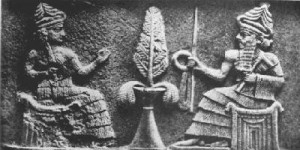 (Bau & her nephew-spouse Ninurta in Lagash)
(Bau & her nephew-spouse Ninurta in Lagash)
8. The temple of the goddess Bau
9. [he has] constructed.
Lacuna.
COLUMN II
The first lines are lost.
1. he has [constructed].
2. For the god [Dun-sha]ga[na] (unidentified)
3. his habitation of [Akkil]
4. he has [constructed].
5. For the god …
6. his tablet-like amulets (?)2
7. (and) his temple he has made.
8. In the middle (of this temple)
9. for the god Za-za-uru (unidentified?),
10. for the god Im-ghud-ên (unidentified?),
11. for the god Gim-nun-ta-ên-a (unidentified?)
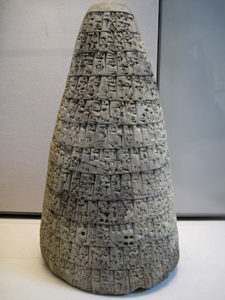 (giant King Urukigina’s “Proclamation of Liberty” text)
(giant King Urukigina’s “Proclamation of Liberty” text)
12. temples he has built for them.
13. For the god Nin-sar (Enki & Ninhursag‘s daughter, Ninkurru‘s mother)
Lacuna.
COLUMN III
The first lines are lost.
1. [For the god Ellil]la (Enlil)
2. [the temple of E-]adda, his [im-]sagga,
3. he has constructed.
4. For the goddess Ninâ (Enki & Ninhursag‘s daughter, mother to Ninmarki),
5. her favorite river,
6. the canal Ninâ-ki-tum-a
7. he has excavated (?).
8. At the mouth (of the canal), an edifice…
Fragments of four other columns remain.
Footnotes
68:1 From a squeeze in the Louvre. Translated by Dr. Oppert in a Communication to the Académie des Inscriptions, 29th February 1884.
69:1 [Bau is probably the Baau of Phœnician mythology, whose name was interpreted “the night,” and who was supposed along with her husband Kolpia, “the wind,” to have produced the first generation of men. The word has been compared with the Hebrew bohu, translated “void” in Gen. i. 2.—Ed.]
69:2 [“The temple of the father.”—Ed.]
70:1 [“The temple of the father.”—Ed.]
70:2 [“The temple of the brilliance of the (eastern) mountain.”—Ed.]
71:2 Possibly the small tablets of white or black stone buried under the foundations of the temples. These tablets were sometimes of metal; those, for example, discovered at Khorsabad. It seems that some consisted also of ivory and precious wood; see W.A.I., i. 49, col. 4, 12.
